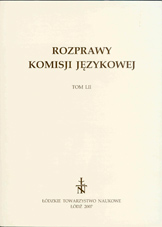Diachronia w badaniach symbolicznej roli języka jako elementu tożsamości narodowej (na przykładzie łużycczyzny)
Diachrony in the research on symbolic function of the language treated as an element of national identity. The case of the Sorbian language
Author(s): Jadwiga ZieniukowaSubject(s): Language and Literature Studies
Published by: Łódzkie Towarzystwo Naukowe
Summary/Abstract: The subject of the article is the functioning of the language in the communicative community of Sorbs (Lusatian Sorbs) – Slavonic national and linguistic minority in Germany. The author describes the significance of the language for Sorbian national culture as well as the role of the language in shaping and preserving Sorbian identity. The Author assumes that “a nation” is a community bound by common origins, territory, culture and the set of values. The functioning of the national cultures manifests itself in creating of the set of symbols, i.e. valuated signs, differing the ethnic group from other groups. The national identification is based on these symbols: “the ours” in the opposition to “the strangers” (Us vs. Them). The language is an important element of the national culture; texts written in the national language are of special importance (cf. A. Kłoskowska, Kultury narodowe u korzeni, 1996). For the Lusatian Sorbs the native language (serbšćina) is the basic element of their identity; it creates the ethnic boundaries between them and their German neighbors and integrates the Sorbian etnicum. The Author describes the history of the Sorbian literary production. In the first period (16th to 18th centuries) the literary production was mainly religious and based on different dialects. The three variants of literary language evolved: the Protestant Upper Sorbian, the Catholic Upper Sorbian and the Lower Sorbian. The Author analyses thoruoghly the golden age of the Sorbian literary language (19th century and the beginning of the 20th century). The Sorbian press played an important role in shaping the norm of the literary language and creating its prestige – both processes are the subjects of the research carried out in The Institute of Slavic Studies of the Polish Academy of Science in Warsaw. Different manifestations of the symbolic function of the Sorbian language have been presented in the article. The Author concludes that it is important to refer to our knowledge of the history of Sorbian language treated as a symbol of the ethnic identity when interpreting the contemporary situation of the Sorbian minority language, now endangered especially by the globalization processes. The history of the language should be also an important clue to devise the linguistic policy.
Journal: Rozprawy Komisji Językowej
- Issue Year: 2007
- Issue No: 52
- Page Range: 269-279
- Page Count: 11
- Language: Polish

